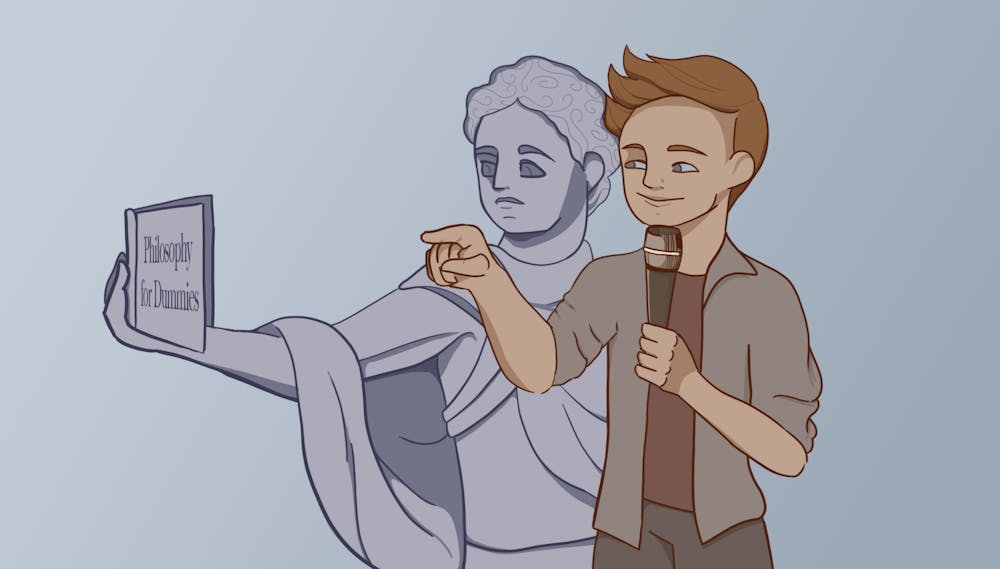William Shakespeare wrote in his 1605 play "King Lear", “Jesters do oft prove prophets.”
Our greatest modern-day philosophers will not be found in the echoey halls of university buildings. They will not be found in the lecture halls or offices of professors. The people who best carry on the tradition of the ancient Greek philosophers and Roman orators are more often found in comedy clubs and auditoriums, filling the rooms with laughter. Comedians are the true public thinkers of our time.
Comedians embody the spirit of the wandering philosophers, orators, poets and prophets of antiquity that would attract a great multitude of people with their profound wisdom or amusing madness.
It struck me when I watched Dave Chappelle’s latest Netflix special “The Closer” that a comedian can convey such complicated and nuanced ideas about social issues and life questions in such a simple setup and punchline format.
Whether it is Bill Burr’s muses on double standards in the social constructs of gender, Jim Jefferies’ bit on the nuances of gun control, George Carlin’s rants about the oligarchic power structures in American society or Richard Pryor’s satire of the racism within the criminal justice system, all of these successful comics have the ability to talk about the most controversial and complicated subjects in a manner using joy instead of inciting fear or hate.
Contrast this with the relatively joyless world of academia. Officially, these scholars, Ph.D. students, doctors and professors, are for all purposes “philosophers,” but they miss so many of the key components that make philosophy a living and vibrant art rather than a cold, dead science.
Comedians are artists, so they appreciate the creativity involved in the questions of life, society, religion and so on. They know that these issues cannot be treated the same way studying quantum mechanics or evolutionary biology is.
An important element of public philosophy missing in academic philosophical circles is relatability. It is nearly impossible for the average person to apply metaphysics and critical social theory to their daily life. However, people can identify with and understand Ms. Pat’s stories of being a single teenage mother struggling to survive and Bill Maher’s monologues on the issues of higher education in the lives of young people.
A comedian’s work in creative writing is often a greater contribution to the cultural climate of our time than a dissertation or an article in an academic journal because life experience is much more important in comedy than academic intelligence.
“The Office” has had a profound effect on popular culture and the way we see the workplace because it involves experiences both the writers and the audience have undergone. Comedies like “The Simpsons” have in the same way affected how we think about the American family unit in the popular conscience.
My favorite comedian, Norm MacDonald, is an ideal example of this phenomenon. His book, “Based on a True Story,” which is a combination of his own real experiences and his imagination, is somehow one of the silliest yet deepest pieces of literature I have ever read. He has shown that what is funny and what is intellectual can harmoniously fit together.
Another area where comedians are better public intellectuals than professional scholars is in the way they gain a large following. More often than not, an academic’s success comes from wealth, connections or loyalty to institutions. The world of academia often seems isolated and exclusive, whereas the world of comedy is a wide-open space centered in the public forum.
Comedians are at the mercy of the common folk. The way they compete to gain support from the people is democratic. The audience acts as the judge and jury, and they are the ones who ultimately decide the fate of a comedian’s career.
Comedy does not only function democratically, but it also has a role in democratic society at large. Comedians are usually the ones challenging the status quo, which again, makes them more akin to the original role of philosophers whereas academics are often part of the establishment.
Comedians are the articulators of common sense, the jesters that brighten up dark subjects, the projectors of the human condition and in every way, they are the voice of the people. These are the true objectives of great philosophers.
Eric Reingardt (he/him) is a freshman studying pre-law at the O’Neill School. He is a freelance writer with a profile on Substack.






